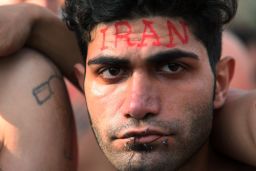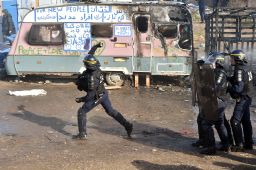Story highlights
European Council's Donald Tusk warns those who aren't legitimate refugees to stay home
Some migrants at the "Jungle" migrant camp in Calais, France, have launched a hunger strike
Britain announces $24 million in extra funding to help France with migrants in Calais
European Council President Donald Tusk on Thursday warned opportunistic “economic migrants” – those who are not legitimate refugees but are seeking better living conditions – not to come to Europe, saying their efforts would be “all for nothing.”
“I want to appeal to all potential illegal economic migrants wherever you are from: Do not come to Europe. Do not believe the smugglers,” Tusk told reporters in Athens, Greece.
“Do not risk your lives and your money. It is all for nothing.”

He made the comments on a trip that also took him to Turkey to encourage a unified response on the migrant crisis ahead of a crucial European Union summit Monday.
The U.N. refugee agency said this week that the constant influx of new arrivals in Greece, the main gateway into Europe, meant the economically ravaged country faced “an imminent humanitarian crisis.”
A bottleneck of migrants has been rapidly building in Greece as countries along the main land route into Europe have all but closed their doors, but the stream of people through neighboring Turkey has continued unabated.
UK announces extra funding for Calais migrant issue
Elsewhere Thursday, British Prime Minister David Cameron announced £17 million ($24 million) in additional funding to help France address the situation at controversial Calais migrant camp the “Jungle.”
Calais, the closest French city to the UK, is a major port where ferries cross the English Channel, and it’s situated close to an undersea tunnel connecting the countries.
Built on a former toxic waste dump, the “Jungle” is a major transit point for thousands of migrants hoping to enter the UK illegally by smuggling themselves on trucks or other vehicles. Many migrants there are reluctant to leave and register in a French reception center as their preferred destination is the UK.
Speaking at a joint French-British summit Thursday in the northern French city of Amiens, Cameron said the funding would go toward strengthening security infrastructure in Calais and assisting French authorities in relocating refugees to reception centers around France, and repatriating economic migrants to their home countries.
Calais topped the agenda in Amiens amid British concerns that current border arrangements that keep most migrants on the French side of the English Channel could come to an end if Britain votes to leave the EU in a June referendum.
French President Francois Hollande told reporters after the summit that there would be “consequences” for immigration arrangements if Britain left the EU.
“I don’t want to scare you, I just want to say the truth – there will be consequences,” Hollande said.
Lips sewn shut in protest
The talks came after it emerged that some residents of the “Jungle” had sewn their mouths shut in a hunger strike to protest the demolition of the camp in northern France.
Calais authorities plan to demolish the southern half of the camp and relocate the inhabitants in response to unsanitary conditions at the site.
On Thursday, a group called Calais Migrant Solidarity published a grainy video statement of the protesters.
Its narrator said these migrants began their protest at noon Wednesday and had “a simple request: for a representative of the European Court of Human Rights to visit the Jungle, see the conditions which they are living in, and address the problems which are facing these people.”
“They have exhausted every way possible of opposing the eviction of their homes,” the video’s narrator said.
The protesters were photographed holding signs aloft. One read: “I left my country and I came here to find my human rights, but unfortunately I have found none.”
Protesters’ shelters destroyed, charity says
Clare Moseley, co-founder of the charity association Care4Calais, told CNN that eight migrants, including Iranians, an Afghan and a Syrian, had sewn their lips shut at the “Jungle” camp Wednesday.
Each had had their shelters destroyed Wednesday and had refused to leave the camp Wednesday night.
Pas-de-Calais prefecture, the local authority where the “Jungle” is located, said such an extreme protest was unwarranted.

“Such facts can only arouse deep emotion and everything will be done to ensure these people receive the appropriate care,” said a statement from the prefecture.
“However, nothing justifies such extreme acts when the state is implementing everything it can to help migrants out of the disgraceful conditions in which they survive in the southern zone of the camp.”
Migrants have joined in hunger strikes involving stitched lips in protests at Idomeni, a major migrant transit camp in Greece, and as far away as Nauru, the Pacific island where Australia operates a refugee processing center. Other acts of self-harm are not uncommon. Last week, migrants attempted to hang themselves from a tree in Athens.
Pro-migrant activists blamed for tensions
The Pas-de-Calais prefecture statement blamed “misinformation and extremist discourse” for willfully distorting the reality of solutions from French authorities.

French Interior Minister Bernard Cazeneuve has accused “radical” pro-migrant activists of stirring up resistance from some of the camp’s residents.
Clashes broke out, tents were set on fire and projectiles were thrown when the clearance began earlier this week, with pro-migrant activists accused of harassing social workers informing migrants of their relocation options.
Clashes in migrant camps in France and Greece as tensions boil over
Fabienne Buccio, prefect of the Pas-de-Calais region, vowed last week that the “Jungle” camp would be dismantled peacefully over a period of several weeks. The clearance would be carried out in cooperation with charity associations that would encourage migrants to move voluntarily to better-equipped facilities, she said.
Charity: Hundreds of unaccompanied children at camp
Buccio told a press conference Wednesday that about 30 to 40 migrants had been removed from the camp each day this week and taken to reception centers.
Pas-de-Calais prefecture said that places were available for relocating migrants in a temporary reception center, or a reception center dedicated to vulnerable people, or any of 102 reception and orientation centers open across France. About 2,800 had left the “Jungle” for a reception center, where 80% had applied for asylum in France, it said.
Help Refugees, a charity working in the camp, said its latest census shows there were nearly 5,500 people living there as of two weeks ago, with nearly 3,500 in the section facing demolition. Those figures include 651 children – 423 of them unaccompanied – and 205 women.
The charity said French authorities do not have enough accommodation available to shelter everyone if the camp is cleared.
Speaking at the Amiens summit Thursday, the French and British leaders confirmed that unaccompanied child migrants at Calais with direct family in Britain would be allowed to come to the UK.
Cameron said those arrangements were already in place, but that he and Hollande had discussed how children in that situation could be reunited with family in Britain more quickly than they were at present.
EU announces emergency aid for Greece
On Wednesday, the European Union announced plans for 700 million euros ($760 million) in emergency aid to Greece and any other countries overwhelmed by the migrant crisis.
The aid proposal, which still needs EU member states to sign off on, is intended to meet basic needs such as food, water and shelter over the next three years.
Tensions boiled over earlier this week at Idomeni, the transit camp on the Greece-Macedonia border, as migrants were denied permission to cross into Macedonia.
Macedonian authorities have been letting a few hundred cross each day, but only Syrians and Iraqis with photo identification. As a result, a backlog of thousands of migrants has built up at the border camp at Idomeni, the U.N. refugee agency says.
EU proposes $760 million in emergency aid for Greece to respond to migrant crisis
More than 131,000 migrants have entered Europe in the first two months of 2016 – a number close to the total for the first half of 2015, according to the U.N. agency’s figures. More than 1 million migrants – many of them fleeing the war in Syria, the rise of ISIS in the Middle East or economic hardship and political repression elsewhere – entered Europe last year.
CNN’s Carol Jordan contributed to this report.




